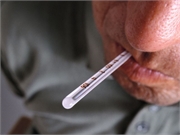- Could Your Grocery Store Meat Be Causing Recurring UTIs?
- Are You Making This Expensive Thermostat Error This Winter?
- Recognizing the Signs of Hypothyroidism
- 10 Strategies to Overcome Insomnia
- Could Artificial Sweeteners Be Aging the Brain Faster?
- Techniques for Soothing Your Nervous System
- Does the Water in Your House Smell Funny? Here’s Why
- Can a Daily Dose of Apple Cider Vinegar Actually Aid Weight Loss?
- 6 Health Beverages That Can Actually Spike Your Blood Sugar
- Treatment Options for Social Anxiety Disorder
How to Prepare, Protect Yourself From Coronavirus

THURSDAY, Feb. 27, 2020With U.S. health officials this week declaring a domestic outbreak of coronavirus a “not if, but when” situation, one expert in infectious illness offers guidance on how you can prepare and protect yourself.
First of all, if you do develop symptoms such as fever, congestion and coughing, “it’s important to stay calm and not panic,” said Dr. Robert Glatter, an emergency medicine physician at Lenox Hill Hospital in New York City.
So far, the large majority of cases tracked in China have been mild or moderate, and most cases do appear to resolve. The current fatality rate is anywhere from below 1% to 4%, and most of those deaths have been occurring in older people with underlying chronic health issues — much the same as is seen with another infectious illness, flu.
Many of the same efforts that people put into avoiding the flu can also help you avoid COVID-19, Glatter said.
The number one step to take: wash your hands.
Germs on surfaces are transmitted via touch, so frequently “wash your hands thoroughly with soap and water for at least 20 seconds,” Glatter said. “While [antiseptic] hand gels are acceptable, hand washing is the preferred method of disinfection.”
He also advised that people “disinfect common work areas, including keyboards, counter tops, doorknobs, and the refrigerator door handle. Alcohol-based cleaners help to kill coronaviruses.”
Other common sense steps also apply.
“Do not share cups or eating utensils, and if you see someone coughing or sneezing near you, move away from them,” Glatter said.
And while there’s not yet a vaccine against COVID-19, Glatter said that “older persons should also make sure they get vaccinated against pneumonia and shingles, since these are more likely if they develop a viral infection such as the coronavirus.” Coronavirus illness can worsen into pneumonia, which can prove lethal to older, more frail people.
If you do develop a fever, cough or cold-like symptoms, contact your health care provider and “stay home from work if you have a fever and a cough,” Glatter said.
“Cough into your elbow or a facial tissue, not your hands,” he added, and “dispose of tissues immediately and wash your hands.”
If coronavirus outbreaks do spread in the United States, it might be prudent to “avoid unnecessary travel and large gatherings of people,” Glatter reasoned.
It’s possible that a widespread coronavirus outbreak might cause a disruption in social services, so Glatter also advised people to take the following steps:
- Have essential medicines — such as ibuprofen and acetaminophen — available to treat fever and muscle aches.
- Make sure all your prescriptions are refilled, and you have at least one month’s supply available.
- Have plenty of water available to stay well-hydrated. Focus on your nutrition, making sure you have healthy food on hand.
- Reach out to your child’s school for information on any plans they might have for closures, and the option of at-home, online instruction.
- Check up on elderly relatives. Because age is a factor in coronavirus illness severity, be sure to also keep in touch with an elderly loved one’s health care provider, “so if they become ill, you’ll be ready to communicate changes in their health condition,” Glatter said.
And what about those face masks? According to Glatter, if you’re co-habitating with someone who has a fever and is frequently coughing or is under quarantine, a mask might help reduce your contact with infected mucous or saliva.
But “it is not necessary for the general public to wear a mask at this time,” Glatter said. “Practicing effective hand hygiene is more important.”
Other experts have echoed that advice.
Dr. Nancy Messonnier directs the National Center for Immunization and Respiratory Diseases at the U.S. Centers for Disease Control and Prevention. In a recent news briefing, she stressed that the CDC doesn’t “routinely recommend the use of face masks by the public to prevent respiratory illness, and we are certainly not recommending them at this time for this novel virus.”
Dr. William Schaffner, a professor of preventive medicine at Vanderbilt University in Nashville, Tenn., agreed. “A surgical mask might provide some protection, but it’s going to be very modest,” he said.
More information
The U.S. Centers for Disease Control and Prevention has more on the new coronavirus.
Source: HealthDay
Copyright © 2026 HealthDay. All rights reserved.










